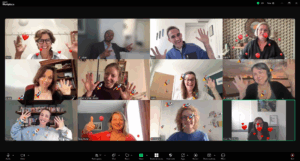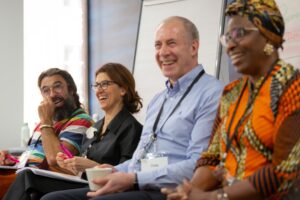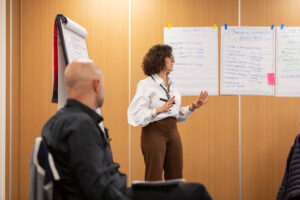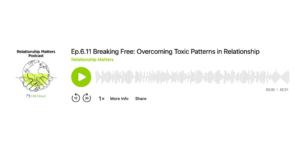How Relationship Systems Intelligence helps leaders and coaches trust what emerges—and why the ORSC Summer Fast Track is the next step for those ready to master systems coaching.
When the tools stop being the focus—and start becoming part of your intuition—something profound begins to shift.
This insight was at the heart of a recent mentoring circle, where a group of ORSC participants gathered to reflect on a module of their Organisation and Relationship Systems Coaching (ORSC) training journey.
The mentoring calls are not a traditional debrief. It is a return to the system, a live demonstration of one of the core principles of Relationship Systems Intelligence (RSI)—that the system is naturally intelligent and self-regulating, and it reveals what it needs if we listen well enough.
In 2025, as workplaces and teams become more complex, uncertain, and relationally demanding, the call for a new kind of leadership and coaching is louder than ever. ORSC offers a way to meet that call—not through scripts and steps, but through relational fluency and deep systems awareness.
What Is Relationship Systems Intelligence?
RSI is an evolution of emotional and social intelligence. Rather than focusing solely on individuals, RSI is about the intelligence that lives in the space between—the dynamic, ever-changing relational field that forms between team members, organisations, families, and communities.
In ORSC, we learn that every team or relationship is a system, and each system has its own voice, values, tensions, and potential. RSI invites us to work with the whole system as the client—helping it surface its own wisdom, conflicts, and direction.
And in the mentoring call, this came alive.
From Right Tool to Right Feel
One of the most powerful insights from the group was the realisation that there is no “correct” tool to reach for in any given moment—only what the system is asking for. In coaching, it’s easy to fall back on technique. But what if the most potent intervention is not the “right” one by theory, but the one that feels right in the emotional field?
“I used to second-guess myself,” was shared. “Now, I’m learning to listen more deeply—to myself and to the system. The clarity comes from that.”
This is the shift from doing to being. From applying a tool to tuning into a system’s emotional resonance and letting that inform what’s needed next.
Confidence in Intuition, Anchored in RSI
Several participants voiced a growing sense of confidence—not in having all the answers, but in being in relationship with the system and allowing it to co-create the path.
This isn’t passive. It requires presence, skill, and courage to stand in the unknown and trust what emerges. And it also requires a deep understanding of the principles of RSI—which offer a kind of compass when certainty isn’t available.
“It’s not about control, it’s about connection,” was noted. “When we are grounded in RSI, we don’t need to know the ‘perfect tool.’ We just need to stay in service of what the system needs.”
A Different Kind of Integration Space
The mentoring call itself modelled the power of ORSC. It was a live system—a group with shared experience, shared learning, and now, shared integration. For many, it was the first time they were reflecting on how they’ve been using the tools in practice, and what’s shifted in how they lead, coach, or relate to others.
In this kind of space, we witness not just what people learned, but who they’ve become.






